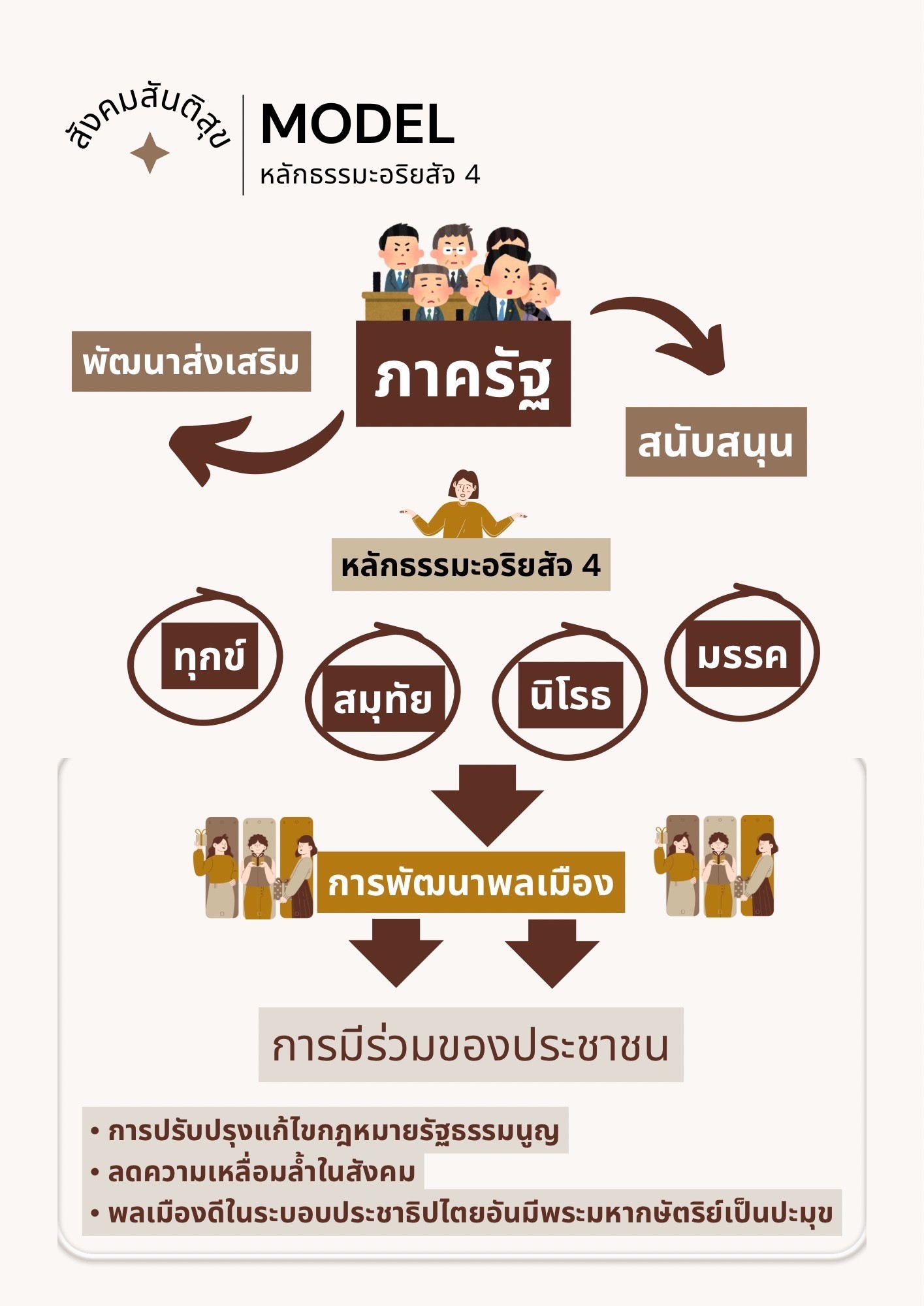The Development of Citizenship in Democracy of the People According to Buddha Drama
Main Article Content
Abstract
The purposes of this research were 1) study the general conditions of citizens' citizenship, 2) study the development of citizens' democratic citizenship according to Buddhist principles, and 3) suggest guidelines for the development of citizens' democratic citizenship. It is qualitative research using document study and related research. In-depth interview from 33 key informant and focus group discussions by 13 qualified experts. Use content analysis techniques to add content and check the accuracy and completeness of the data using tranqulation techniques. The present it descriptively.
The results revealed that:
1. Citizenship in a democratic regime for all people is necessary to create a strong and stable democracy. In addition to reducing conflicts and violence in Thai society, it also enables “Thai citizens” to become “ASEAN citizens” and “global citizens” with higher potential to adapt and effectively cope with economic and political volatility as well as cultural dynamics in the era of globalization.
2. Citizenship development It was found that the application of the Four Noble Truths of Buddhism, namely suffering, to develop citizenship in a democratic regime of the people makes people aware of the current conditions or situations that can cause problems at any time, indicating that suffering arises according to religious principles. When there is suffering, we must try to find a way to end the suffering. If politics and government have problems, we must know the cause of the problem. To find a way to end suffering and problems, we must first know the cause of the suffering.
3. Guidelines for developing democratic citizenship according to Buddhist principles: The Buddha has provided excellent guidelines for dealing with problems or suffering. This approach involves careful consideration of the problem or suffering, being reasonable, and avoiding hasty decisions. Once the problem or suffering is understood, it is important to identify its cause. The principles of Buddhism and those of politics and governance share common ground. When integrated and applied together, they can be practiced in harmony. By following these steps, it is possible to resolve issues, leading to the development of democratic citizenship in a creative, reconciliatory, and confidence-building manner, characterized by honesty, fairness, and adherence to the law. This will benefit the people of the nation enduringly.
Article Details

This work is licensed under a Creative Commons Attribution-NonCommercial-NoDerivatives 4.0 International License.
เพื่อให้เป็นไปตามกฎหมายลิขสิทธิ์ ผู้นิพนธ์ทุกท่านต้องลงลายมือชื่อในแบบฟอร์มใบมอบลิขสิทธิ์บทความ ให้แก่วารสารฯ พร้อมกับบทความต้นฉบับที่ได้แก้ไขครั้งสุดท้าย นอกจากนี้ ผู้นิพนธ์ทุกท่านต้องยืนยันว่าบทความ ต้นฉบับที่ส่งมาตีพิมพ์นั้น ได้ส่งมาตีพิมพ์เฉพาะในวารสาร วิชาการธรรม ทรรศน์ เพียงแห่งเดียวเท่านั้น หากมีการใช้ ภาพหรือตารางของผู้นิพนธ์อื่นที่ปรากฏในสิ่งตีพิมพ์อื่นมาแล้ว ผู้นิพนธ์ต้องขออนุญาตเจ้าของลิขสิทธิ์ก่อน พร้อมทั้ง แสดงหนังสือที่ได้รับการยินยอมต่อบรรณาธิการ ก่อนที่บทความจะได้รับการตีพิมพ์References
เกษฎา ผาทอง และธีรภัทร์ เสรีรังสรรค์. (2561). พระพุทธศาสนากับการเมืองในสังคมไทย. วารสารวไลยอลงกรณ์ปริทัศน์ (มนุษยศาสตร์และสังคมศาสตร์), 8(1), 195-207.
ชนาธิป ศรีโท. (2563). ความเข้าใจเรื่องอริยสัจ 4 ในพระพุทธศาสนา. วารสารวิชาการพระพุทธศาสนาเขตลุ่มน้ำโขง, 3(2), 56-69.
พระเจษฏาพร อุ่นเรือน. (2557). การใช้อริยสัจสี่ในการจัดการชีวิตของนักเรียนชั้นมัธยมศึกษาตอนต้น โรงเรียนขาลสุวรรณอนุสรณ์ อำเภอเมืองเชียงใหม่. (วิทยานิพนธ์ศึกษาศาสตรมหาบัณฑิต). เชียงใหม่: มหาวิทยาลัยเชียงใหม่.
พระทอง บุตรดี. (2561). การจัดการศึกษายุค 4.0: ภายใต้การพัฒนากรอบหลักสูตรการสร้างพลเมืองตามแนวพระพุทธศาสนา. (วิทยานิพนธ์ศึกษาศาสตรมหาบัณฑิต). กรุงเทพฯ: มหาวิทยาลัยราชภัฏสวนสุนันทา.
วรากรณ์ สามโกเศศ. (2554). การศึกษาเพื่อสร้างความเป็นพลเมือง. เข้าถึงได้จาก https://www.moe.go.th/การศึกษาเพื่อสร้างความ/
สุทธญาณ์ โอบอ้อม และคณะ. (2563). การเสริมสร้างจิตพฤติกรรมการเป็นพลเมืองที่ดีในสังคมประชาธิปไตยของนักเรียนในจังหวัดนครปฐม. วารสารวิทยาลัยสงฆ์นครลำปาง, 9(2), 65-77.

